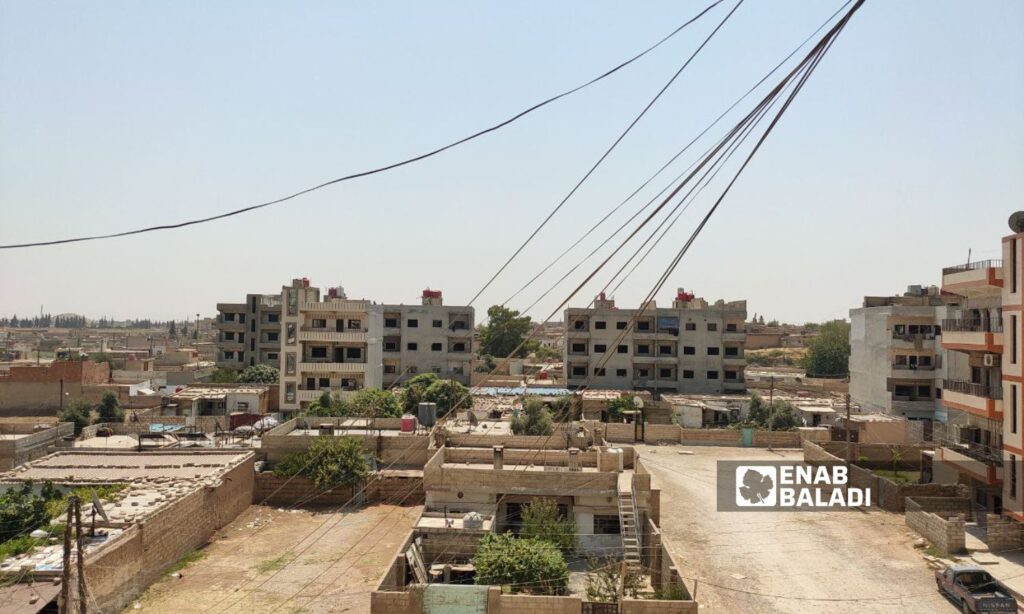Al-Hasakah – Majd al-Salem
A state of unprecedented stagnation has affected the real estate market in the regions of northeastern Syria for months, causing losses of thousands of dollars to merchants, real estate owners, and contracting workers in the city of Qamishli and the towns of al-Hasakah governorate.
Mamdouh al-Hussein, 55, owner of a real estate office in the city of Qamishli, told Enab Baladi that the area’s real estate supply for sale far exceeds purchase requests. He added that on an almost daily basis, people come to the office to register the specifications of their homes to display them for sale, in addition to displaying them through social media platforms.
This reflects the extent of the desire to sell real estate among residents, and the sale is usually urgent for the purpose of traveling, so many of those who want to sell their properties reduce the price even less than the real price of the property (selling at a loss), al-Hussein says, adding that the sales offers not only include ready-made apartments but also unfinished apartments, Arabic-style houses, shops, and agricultural lands.
Regarding the level of price decline, al-Hussein told Enab Baladi that some properties lost about $6,000 of their price, as one of the real estate owners recently sold his house through his office for $17,000, even though its price could reach $21,000, according to real estate market standards.
The US dollar is trading at 13,850 SYP according to the S-P Today website, which covers the trading rate of the Syrian pound to the dollar.
Opportunity to buy the “house of a lifetime”
Last year, it was impossible for a person with an amount not exceeding $5,000, for example, to think about buying an unfurnished apartment, even if it was on the fifth floor in one of the lively neighborhoods in the city of Qamishli, due to the significant rise in real estate prices and the increasing demand for it, especially by those who immigrated and took refuge in Europe several years ago and who hail from al-Hasakah.
Salim Mohammad, 42, a resident of Qamishli, told Enab Baladi that during several years of work in several fields, he was able to save an amount of $6,000, and because he still lives in a rented house, he decided to buy an unfinished apartment and gradually furnish it after the decline in the value of real estate, considering the current recession an opportunity to buy the “house of a lifetime.”
Mohammad is looking for an apartment in installments that is close to the city center, explaining that he found unfurnished apartments located on the third and fourth floors offered for sale at prices ranging between $10,000 and $14,000. Some of their owners have accepted the sale in installments, and what is delaying the purchase of the apartment until now is the dispute on the duration and amount of installments that he must pay.
Ahmed Mohammad, 38, from the al-Hilaliya neighborhood, told Enab Baladi that, months ago, he bought an unfurnished apartment of 100 m2, located on the fourth floor, for $15,000, but he put the apartment up for sale for $10,000 because he wanted to travel after about ten days to northern Iraq and then to one of the European countries.
Ahmed would rather lose the difference in price between buying and selling than lose his opportunity to travel, considering that his loss can be compensated in the coming years when he “settles in one of the European countries,” according to his opinion.
Contractors are losing
Trade in the real estate market was profitable, and any project carried out was almost guaranteed a profit, according to the contractor, Anwar al-Akoub, 59, which was the case in the real estate market in Qamishli about a year ago.
According to al-Akoub, the current situation is very different, as most contractors are incurring losses of thousands of dollars due to the high prices of materials such as cement, iron, and sand, the high wages and expenses of workers, and the operation of machinery in construction projects, and the corresponding decrease in real estate sales prices.
As a result of the residents’ desire to emigrate, they resort to financing their asylum journey by selling their real estate, which caused the number of projects implemented by contractors in the region to decrease by about half, and the period during which apartments are sold increased significantly compared to before.
Due to the decline in real estate prices and the high cost of materials, some contractors left their projects that they started months ago.
According to what Enab Baladi monitored in the region, the price of a ton of iron reached about 14 million Syrian pounds (about $1,000), and a ton of cement reached approximately 1,680,000 Syrian pounds (about $120).
The cladding cost of an apartment amounted to between $8,000 and $15,000, depending on the type and quality of the materials used, noting that most of the materials, including basic building materials such as cement and iron, enter the region coming from the northern Iraqi region through the Semalka border crossing, which is controlled by the Syrian Democratic Forces (SDF).

